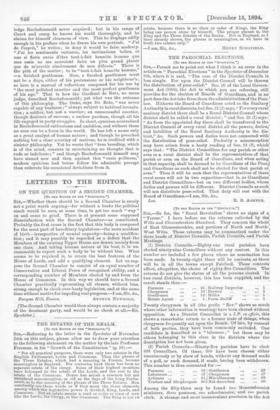THE ESTATES OF THE REALM.
[To THE EDITOR OP THE EPEOTATOR."] Sin,—Referring to the letter in the Spectator of November 24th on this subject, please allow me to draw your attention to the following statement on the matter by the late Professor Freeman, in his Growth of the Constitution" (p. 98) :— "For all practical purposes, there were only two estates in the English Parliament, Lords and Commons. Thus the phrase of the Three Estates. which had a meaning in France, became meaningless in England. For centuries back there has been no separate estate of the clergy. Some ef their highest members have belonged to the estate of the Lords, and the rest to the estate of the Commons. Hence has arisen a common but not unnatural misconception, as old as the days of the Long Parlia- ment, as to the meaning of the phrase of the Three Estates. Men constantly use these words as if they mean the three elements among which the legislative power is divided, King, Lords, and Commons. But an estate means a rank or order or class of men like the Lords, the Clergy, or the Commons. The King is not sn estate, because there is no class or order of Kings, the King being one person alone by himself. The proper phrase is, the King and the Three Estates of the Realm. But in England, as I have already shown, the phrase is meaningless, as we have in truth two estates only."








































 Previous page
Previous page